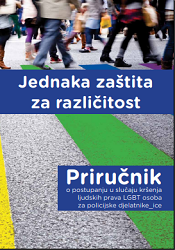

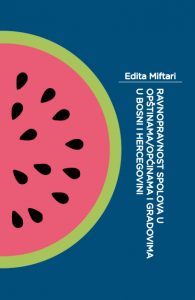
Keywords: gender equality; BiH;
Posljednjih nekoliko godina Bosna i Hercegovina se suočava sa suštinskim promjenama u okviru društvene i političke transformacije. Težnja ka priključenju Evropskoj uniji te sveobuhvatna reforma sistema i društvenih odnosa vodila je ka unapređivanju politika za ravnopravnost spolova i jednake mogućnosti, a naročito ka izgradnji institucija na svim nivoima vlasti koje bi uspješno sprovodile ove politike. Tako danas u BiH postoji nebrojeno mnogo institucionalnih mehanizama za ravnopravnost spolova, kako pri zakonodavnoj, odnosno predstavničkoj, tako i pri izvršnoj vlasti i to na svim nivoima, od najvišeg, državnog do najnižeg, lokalnog nivoa.
More...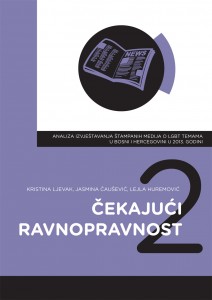
Keywords: printed media; reporting; LGBT; research; BiH;
Analiza koja je pred vama nastavak je praćenja izvještavanja o LGBT temama u bosanskohercegovačkim štampanim medijima, koju treću godinu zaredom objavljuje Sarajevski otvoreni centar. Autorice su uradile ovu analizu koristeći svoja prethodna znanja i iskustva rada na analizama sadržaja medijskog izvještavanja iz 2011. i 2012. godine, i zahvalne su što su dobile priliku da i treću godinu zaredom prate nivo doprinosa štampanih medija u borbi protiv diskriminacije lezbejki, gejeva, biseksualnih, interspolnih, trans* i svih ostalih queer osoba2 u medijskom prostoru Bosne i Hercegovine. Kako u svojoj knjizi pišu Marko i Dardić, potrebno je kontinuirano pratiti i analizirati medije, jer pojedini mediji prepoznaju realne probleme sa kojima se pripadnici_e marginalizovanih grupa suočavaju i aktivno o tome izvještavaju, doprinoseći tako ne samo većoj vidljivosti ovih grupa nego i njihovom pozicioniranju u javnom i političkom životu. U vremenu komercijalizacije i tabloidizacije medijskog prostora, od velike je važnosti promovisati etičke i profesionalne standarde izvještavanja i koncept društveno odgovornog novinarstva, i ne dozvoliti da politički i ekonomski centri moći presudno utiču na kreiranje medijskih sadržaja. Mediji, odnosno novinari i novinarke, često su jedina spona između predstavnika_ca različitih marginalizovanih i ranjivih grupa. Profesionalnost novinarskog pisanja, etičnost i odgovornost pomjeraju društvo u kojem živimo ka prostoru veće tolerancije. Imajući u vidu rasprostranjenost i uticaj medija, bilo bi višestruko korisno za LGBT osobe u BiH da se u što više štampanih medija, kao i u svim ostalim medijima, pojave smišljene uređivačke politike koje prepoznaju značaj neselektivne borbe za ljudska prava i koje insistiranje na toj važnosti perpetuiraju kroz svoj prostor u skladu sa etikom i vrijednostima novinarske struke.
More...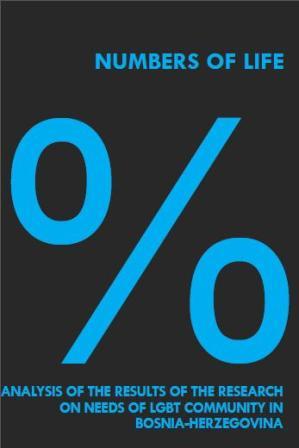
Keywords: LGBT community; needs; research; BiH;
Between February and June 2013, Sarajevo Open Centre conducted research about the rights, needs and problems of the LGBT community in BiH. The initial aim of this research was to map the real problems and to assess the particular needs of LGBT persons in BiH. The results will enable defining precise and clear arguments that could be used in future problem solving, through concrete activities, such as advocacy, education, meetings and similar, with institutions which are proven to act in discriminative manner against LGBT persons, by not performing their activities in accordance with ethics or through not intercepting the policy of selective human rights defending. An interdisciplinary theoretical approach is necessary for developing several perspectives that will highlight the complexity of sociological phenomena and create space for allocation of particular context of Bosnia and Herzegovina into a broad theoretical framework. By using questionnaires, we have explored how persons of non heteronormative gender and sex identity and sexual orientation, live in Bosnia and Herzegovina – which persons from their surroundings are aware of their LGBT identities and whether they support them, their experiences of discrimination and violence, how they handled these human rights violations, how did society and the legal system react, their opinions on Gay Pride Parade, their confidence in the police, whether their mental health suffers due to fear and homophobia they are exposed to because of their sexuality or gender identity, and how health workers relate to them. Likewise, we have inquired about the attitudes of LGBT persons on their social needs, their opinion about the LGBT community itself, on activities of Sarajevo Open Centre, and political participation. Data that was gathered through the research was processed in SPSS statistical software. A descriptive analysis was written in accordance with the statistical inquiry and is based on an interdisciplinary approach to areas and topics that is dealing with. First of all, it was important for us to use the analyses to interpret the issues that we have defined as our objectives. These analyses will serve as a platform for further advocacy, towards governmental and other institutions – police, health care, responsible ministries, judiciary and so forth – for changes that LGBT persons will benefit from. The research encompassed 545 persons ranging in age from 54 to 15. There were 275 persons of female sex and 246 of male sex, 14 intersexual and 9 transgender persons and 1 person who did not want to define itself according to sex. Out of these figures, 252 persons identified themselves through female gender, 235 through male, 9 persons was identified as transgender, while 42 of them does not identify themselves through gender and 7 persons have their own self creation of gender. When it comes to sexual orientation, there are 338 persons who are homosexuals, 151 bisexual, 25 pan sexual, 7 persons declared themselves as asexual, 9 as heterosexual, while 15 examinees identified as ‘other’ and added their own definition of their sexuality. Concerning the significant number of trans and intersex persons who have participated in the research, one chapter is particularly dedicated to them. The question related to which persons from their surroundings are aware of their LGBT identity has shown that for 90, 4 % of LGBT persons, their friends do know and the majority is supportive – out of the overall number, 89, 2 % of friends support their LGBT friends. Likewise, colleagues from work place/school/college are more familiar with the fact that a person is LGBT than their family members. Namely, for 46, 4 %, their work/school/college surroundings know that they are LGBT and two third of them (66, 6 %) gains their support. Sister/s know about her brother/sister/s being LGBT in 44, 7 % of cases and 86, 7 % of them is supportive, which makes them a group that is, after friends, the most supportive one. Mother/guardian is in the fourth place and for 40, 7 % of LGBT persons; she is familiar with their LGBT identity, but only 61 % of examinees have the support from their mother/ guardian. Brother/s are familiar with it in 37, 5 % of cases and majority is supportive – 75, 9 %. Acquaintances of LGBT persons are in 36, 8 % of cases familiar with their identities and most of them are supportive (67 %). Father/guardian is familiar with sexual orientation or gender identity of every fifth person (22, 7 %) and less than half of them supports their children (41, 8 %), which makes them the least supportive group among the close family members. For 15, 2 % of examinees, their broader family is familiar with their LGBT identity and supportive in 65, 7 % of cases. The question of whether one has experienced any form of discrimination because he/she is an LGBT person was answered positively by 35, 8 % of examinees and negatively by 63, 1 %. It is clear that persons who are not out to the broader public – at the workplace, college, to their acquaintance etc. – cannot be discriminated against due to their sexual orientation. This research shows that colleagues from work, school or college in 40,7 % of cases are aware that their colleague is an LGBT person but almost half of them are not supportive. Likewise, for every third person their acquaintances know his or her sexual orientation. All this together fits into an image that a little over one-third of LGBT persons are out to their broader surroundings and in accordance with that, discrimination is experienced only by every third LGBT person. Discrimination is not reported in 93, 8 % of cases. Only 3 cases of discrimination were prosecuted and one was completed successfully, while another 23 have never been prosecuted. Because of their gender expression or sexual identity, 23, 5 % of persons have experienced violence, while 74, 2 % of them have never been victims of violence. Physical violence was experienced by every third person, and sexual violence by almost every fifth person. Victims of violence are almost always persons who are out. 130 persons have suffered through violence, and only 17 of them have reported it, while 3 cases have been prosecuted in court and 2 cases are still ongoing. If we consider the fact that only 3 cases out of 17 that have been reported and prosecuted in court, while 2 other are still ongoing, it is nothing unusual that LGBT persons are not confident towards the institutions that are supposed to protect them. 23, 1 % of examinees have confidence in the police, while 73, 6 % does not have. Every third person who, due to the consequences of homophobia, suffers from depression, fear, anxiety, affliction or any other symptoms, is determined to seek for professional psychological, psychiatrists or therapeutics help because of assumed incompetence of persons one would approach to, and because of the fear that their sexuality will be uncovered. Almost 70 % of examinees have declared a lack of support from family and friends as the biggest issue. Although 82, 5 % of LGBT persons do not have to hide their gender identity and sexual orientation in front of their friends, it is obvious that the majority does not receive the desired emotional, psychological and social support. On the other hand, as the question related to support has shown (chart 10) – family is also not supportive, so the severity of this information is only being confirmed through questions on the biggest issues. Almost as big is the problem of physical violence (attacks, property wreckage and similar) – 68, 9 % of persons have marked it as the biggest issue. Psychological/verbal violence was marked as a problem by almost the same number of persons – 68, 7 %. When the issue of violence, whether physical or psychological, is associated with the failure of institutions that are supposed to punish those who commit it, the issue of processing and punishing violence is considered an urgent one, which needs to be resolved. Discrimination at the workplace, at school or at college is one of the biggest problems for 62.6% of examinees, which places the problem of discrimination on almost the same level with violence. The lack of state institutions’ support programs was described by 66, 4 % of examinees. Police, judiciary or certain areas of health system do not provide their services professionally, due to the lack of knowledge related to LGBT issues and to the high level of homophobia. The objective of examining the level of active and passive political participation of LGBT persons was to highlight the fact (which implies, but is not considered relevant, and even less is seen as a certain political potential) that LGBT persons are also voters in the elections (more than half of examined LGBT persons exercises their right to vote), that they are also members of political parties in BiH (62 persons are members of parties), and that they run for elections and have certain political results (13 out of 62 persons have been candidates on elections and have had certain results). Based on the analyses of collected statistical data and additional comments that examinees have emphasized, we have produced general conclusions and recommendations for certain sectors – some areas of the health system, police, but also civil society – since it was shown that they are not providing their services professionally, while we have tackled reasons and solutions of this situation in separate recommendations.
More...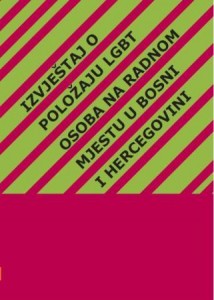
Keywords: workplace; LGBT population; BiH; mobbing; discrimination; report;
Cilj Izvještaja o položaju LGBT osoba na radnom mjestu u Bosni i Hercegovini jeste da pokaže pravni okvir zaštite od diskriminacije i mobinga na radnom mjestu osoba drugačije seksualne orijentacije i rodnog identiteta na međunarodnom, evropskom i nacionalnom nivou. Antidiskriminacijsko pravo Bosne i Hercegovine relativno je dobro postavljeno, no - kao što je to slučaj i sa drugim tranzicijskim zemljama - njega ne prati i adekvatna primjena. Razlog tome vjerovatno leži u strahu LGBT osoba da prijave slučajeve diskriminacije i/ ili mobinga na radnom mjestu zbog gubitka posla. To je posebno izraženo u Bosni i Hercegovini, zemlji sa velikom stopom nezaposlenih i skoro permanentnom političkom i ekonomskom krizom. LGBT osobe ne osjećaju se sigurnima javno iskazati svoju seksualnu orijentaciju i rodni identitet zbog opasnosti uskraćivanja prava na radnom mjestu, kao i drugih prava koja svoju bazu imaju u radnom odnosu. U Bosni i Hercegovini ne postoje evidentirani slučajevi diskriminacije LGBT osoba na radnom mjestu, što ne znači da oni i ne postoje. Komparativna iskustva u Srbiji i Hrvatskoj, s kojima Bosna i Hercegovina dijeli istu pravnu tradiciju i slične antidiskriminacijske propise, mogu biti dobar pokazatelj na koji način se ti propisi trebaju, odnosno ne trebaju, primjenjivati, te sve probleme koji prate primjenu relativno novih propisa u regiji. U Bosni i Hercegovini nisu provedena fokusirana istraživanja koja bi se bavila ispitivanjem stavova poslodavaca_teljki i zaposlenika_ica, kada se radi o zaposlenicima_ama drugačije seksualne orijentacije i/ili rodnog identiteta, niti su provedena ispitivanja LGBT osoba o njihovom položaju na radnom mjestu. U izvještaju su prezentirana neka istraživanja koja su provedena u Hrvatskoj, te se zbog slične tradicije i političke kulture odnosa prema manjinama ti podaci mogu koristiti kao vid pokazatelja odnosa prema LGBT osobama i u Bosni i Hercegovini. Sarajevski otvoreni centar je, u okviru rada na ovom izvještaju, poslao dopise organima nadležnim za primjenu antidiskriminacijskih propisa, udruženjima poslodavaca_teljki i sindikatima. Na osnovu dobijenih informacija se može zaključiti da nijedna od institucija koja je dostavila odgovor na postavljena pitanja nije upoznata sa slučajevima postojanja diskriminacije na radnom mjestu na osnovu seksualne orijentacije i rodnog identiteta, ili takvim podacima ne raspolaže, što je uvjetovalo i nepoznavanje da li su diskriminacija ili mobing učinjeni od strane poslodavca_teljke ili drugog zaposlenika_ice. Da bi se adekvatno odgovorilo na pitanje diskriminacije LGBT osoba na radnom mjestu, potrebno je preduzeti sljedeće aktivnosti: - usvajanje izmjena i dopuna antidiskriminacijskih zakona (Zakona o ravnopravnosti spolova i Zakona o zabrani diskriminacije) u okviru kojih bi se izričito navodi i rodni identitet kao zabranjen osnov diskriminacije u pogledu ostvarivanja prava na rad i u vezi sa radom LGBT osoba; - usvajanje izmjena i dopuna zakona iz radnopravne oblasti u okviru kojih bi se izričito naveli seksualna orijentacija i rodni identitet kao zabranjeni vid diskriminacije u pogledu ostvarivanja prava na rad i u vezi sa radom LGBT osoba; - usvajanje odgovarajućih strategija i akcionih planova na državnom, entitetskom i kantonalnom nivou, te nivou Brčko distrikta Bosne i Hercegovine, u okviru kojih bi pitanja diskriminacije na radu i mobinga LGBT osoba našla posebno mjesto i zaštitu; - usvajanje politika na nivou sindikata i udruženja poslodavaca_teljki, kroz koje bi se pitanje položaja LGBT osoba na radnom mjestu posvetila posebna pažnja i zaštita; - utjecaj na usvajanje politika zaštite prava LGBT osoba na radu i povodom rada na nivou individualnih poslodavaca_teljki (preduzeća, javnih ustanova i sl); - utvrđivanje programa edukacije i senzibiliziranja poslodavaca_teljki i sindikata o potrebama i marginalnom položaju LGBT osoba na radnom mjestu; - rad na polju saradnje ministarstava, sindikata, udruženja poslodavaca_teljki i nevladinih organizacija koja se bave pitanjima prava i sloboda LGBT osoba.
More...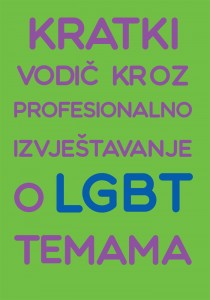
Keywords: professional reporting; guide; LGBT issues;
The term sexuality is closely related to the terms sexual identity and sexual orientation. Sexual identity can be defined as a combination of one's own sexuality, sexual orientation, and public representation of sexual goals, i.e., as the way a person defines his or her own sexual orientation. Sexual orientation is commonly defined as a pattern of emotional and sexual attraction to people of the same or opposite sex. In theoretical terms, sexual orientation encompasses three dimensions: sexual behavior, emotional and erotic attraction, and sexual fantasy. People may or may not show their sexual orientation through their behavior.
More...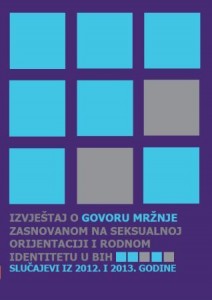
Keywords: hate speech; LGBT population; BiH; sexual orientation; gender identity; legislation and regulations acts; report;
Govor mržnje u BiH, usmjeren prema LGBT osobama, je u porastu zbog sve veće vidljivosti LGBT osoba. Postojeća zakonodavna regulacija govora mržnje je nedovoljna, iako medijima zabranjuje korištenje govora mržnje, ne dotiče se pojedinaca koji ovaj govor svakodnevno izražavaju u javnosti, najčešće na web portalima i facebook stranicama. Iako uglavnom izbjegavaju direktno izražavanje i prenošenje govora mržnje, i sami mediji naizgled neutralnim izvještavanjem i navođenjem, te davanjem medijskog prostora homofobičnim i transfobičnim stručnjacima_ kinjama i pojedincima_kama da izražavaju svoje mišljenje, pomažu širenju govora mržnje i njegovoj dostupnosti široj javnosti. Ovim načinom izvještavanja mediji izbjegavaju vlastitu odgovornost za preneseni sadržaj, a istovremeno privlače pozornost javnosti i prenose pogrešnu sliku o LGBT osobama, kojom se obično pokušavaju poduprijeti već postojeći stereotipi i predrasude. Iako postoje mehanizmi sankcionisanja i uklanjanja govora mržnje preko Regulatorne agencije za komunikacije, koja je nadležna za elektronske medije, i Vijeća za štampu u BiH, koje je samoregulatorno tijelo štampanih medija, oni sami za sebe, bez krivičnog gonjenja odgovornih, ne dovode do željenih rezultata niti do uklanjanja neetičke prakse medijskog izvještavanja. Govor mržnje usmjeren prema LGBT osobama se izražava od netačnih tvrdnji i proglašavanja LGBT osoba bolesnim i devijantnim, do pozivanja na diskriminaciju i nasilje, u najgorim slučajevima do prijetnji smrću, te doprinosi netolerantnom stavu bh. društva i marginalizaciji LGBT osoba. Ispoljavanjem govora mržnje, također se dovodi i do težih incidenata, pa čak i počinjavanja krivičnih djela i zločina iz mržnje, a koristi se i da bi se podržali počinitelji tih djela, te opravdala njihova djela, čime se šalje poruka LGBT osobama i ostalim marginaliziranim grupama da nisu poželjni_e u bh. društvu. Da bi obezbijedila poštivanje prava i sloboda, kao i dostojanstvo svih svojih građana, između ostalih i LGBT osoba, te pružila adekvatnu podršku marginaliziranim grupama koje su najčešće žrtve govora mržnje, i u potpunosti dokazala da osuđuje netoleranciju, mržnju, diskriminaciju i nasilje, Bosna i Hercegovina bi trebala: - ustanoviti i javno diseminirati odgovarajuću i sveobuhvatnu definiciju govora mržnje koja, između ostalog, uključuje i seksualnu orijentaciju i rodni identitet kao zabranjene osnove za govor mržnje; - adekvatnu zabranu govora mržnje propisati krivičnim zakonima oba entiteta tj. Federacije BiH i Republike Srpske i Krivičnim zakonom Brčko distrikta; - zabranom govora mržnje obuhvatiti ne samo medije kao moguće počinioce, nego i državne institucije i sve ostale pravne i fizičke osobe.
More...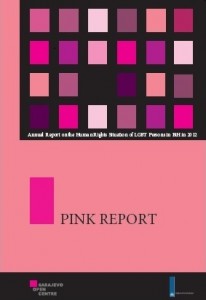
Keywords: LGBT population; human rights; BiH; report;
Authorities in BiH are not really aware that LGBT persons are a part of society and consider their rights inferior to the rights of other groups. This kind of attitude is mostly explained by the low number of visible LGBT persons, and the common consideration that this (meaning homosexuality) or them (meaning LGBT persons) do not exist in BiH. When discussing LGBT rights, most institutions in BiH assume that the prohibition of discrimination regulated by the Anti-discrimination Law in BiH is enough to enable the protection and equality of LGBT persons with other citizens of BiH, and are not sensible enough to notice or deal with other issues that LGBT persons face daily in BiH. Throughout 2012, as LGBT topics have become more visible in BiH through the media coverage, which is still mostly sensational and shocking in order to attract the viewers, and through the work of organisations working on LGBT human rights and activists, hate speech and hate crimes aimed at LGBT people have become more evident as well. The increased visibility of LGBT activism in 2012 was followed by hate speech on web portals, which became even more severe and threatening. In all the cases presented in this report, the response of the authorities was either non-existent or insufficient, and in some of the cases the perpetrators of the incidents were officials. Authorities consistently fail or refuse to condemn the hate speech and intolerance aimed at LGBT persons or to sanction the perpetrators, which leads to the lack of trust of LGBT persons have in governmental institutions. This lack of trust results in LGBT persons not reporting more serious incidents and cases such as discrimination and hate crimes. The first step to better recognition and protection of the rights of LGBT persons is the harmonisation of existing legislation with the Anti-discrimination law of BiH. This was supposed to be done by 2010, but has not yet been completed. Other changes to legislation, such as the introduction of hate crimes and proper prohibition of hate speech, should be included in the Criminal Code of the Federation of BiH, in order to promote and enhance the protection of the rights of LGBT persons, as well as all individuals and minority groups in BiH. Authorities should also be aware that legislation itself is not enough to prevent the violation of human rights of LGBT persons and that they must enforce these laws and regulations. The authorities should also organise mandatory trainings and education for all public officials and personnel, such as police officers and public administration employees.
More...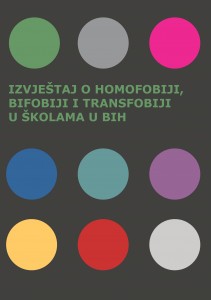
Keywords: homophobia; bi-phobia; transphobia; schools; LGBT population; BiH;
Cilj ovog izvještaja je da pokaže pravni okvir za ostvarivanje prava na obrazovanje LGBT osoba u srednjim školama u BiH, odgovarajuće obrazovne strategije, stepen uključenosti prava na obrazovanje LGBT osoba, način prikaza tema vezanih za LGBT osobe u udžbenicima koji se koriste u srednjim školama u BiH te istraživanja koja pokazuju stavove učenika_ica u pogledu homofobije, bifobije i transfobije. Zakon o ravnopravnosti spolova (2003) po prvi put izričito uvodi zabranu diskriminacije na osnovu seksualne orijentacije; indirektno na osnovu rodnog identiteta u pogledu ostvarivanja prava na obrazovanje LGBT osoba, te uvodi obavezu u pogledu prikaza tema vezanih za seksualnu orijentaciju i rodni identitet u nastavnim planovima i programima u smislu promovisanja principa jednakosti. Isti cilj postoji i u Zakonu o zabrani diskriminacije (2009), koji izričito navodi i rodni identitet kao zabranjeni osnov diskriminacije. Ove zakonske akte ne prate odgovarajuće strategije o obrazovnim politikama na državnom nivou koje se bave pitanjima prava na obrazovanje LGBT osoba, odnosno politike obrazovanja na entitetskom i kantonalnom nivou, te se homofobija, bifobija i transfobija uopšte ne spominju kao oblasti u kojima državna tijela i obrazovne institucije trebaju posebno djelovati kao bi se uklonila diskriminacija, netačne informacije i stereotipne slike. Da postoji diskrepancija na socijalnoj bazi pokazuje istraživanje o stavovima prema LGBT osobama koje je provedeno među učenicima_cama 2005. godine od strane Udruženja Q, te o načinu prikaza tema vezanih za LGBT osobe u udžbenicima koji se koriste u srednjim školama u BiH (2010). Na kraju, stavovi učenika_ca u srednjim školama pokazuju visok nivo spremnosti učenika_ca na verbalno i fizičko nasilje prema LGBT osobama (2012). Sve ovo ukazuje na potrebu da država i obrazovne institucije preduzmu odgovarajuće korake ka uklanjanju diskriminacije, te homofobije, bifobije i transfobije u srednjim školama u BiH kroz preduzimanje sljedećih koraka: - usvajanje izmjena i dopuna zakonskih akata koji regulišu oblast obrazovanja u BiH, kojima će seksualna orijentacija i rodni identitet eksplicitno postati zabranjeni osnovi diskriminacije u pogledu ostvarivanja prava na obrazovanje LGBT učenika_ica; - usvajanje i/ili izmjena obrazovnih strategija kojima će se odgovarajući organi obavezati na državnom, entitetskom, kantonalnom nivou, te nivou Brčko distrikta BiH, odnosno obrazovne institucije o uklanjanju netačnih informacija i stereotipa koji utječu na stvaranje i razvoj homofobije, bifobije i transfobije; - revidiranje nastavnih planova i programa u smislu uklanjanja netačnih i stereotipnih predodžbi o LGBT osobama, te otvaranje prostora za izučavanje tema vezanih za LGBT osobe, odnosno tema vezanih za drugačije seksualne orijentacije i rodne identitete. Ovaj prostor se prije svega može otvoriti unutar predmeta kao što su književnost, sociologija, psihologija, filozofija, demokratija i ljudska prava i sl; - revidiranje udžbenika koji sadrže netačne i stereotipne podatke o LGBT osobama, te razvijaju pogrešan stav kod učenika_ica o pitanjima koja su vezana za LGBT osobe; - uključivanje, kako u nastavu, tako i u sve vannastavne oblike tema vezanih za seksualnu orijentaciju i rodni identitet; - senzibiliziranje nastavnika_ca, pedagoga_inja, psihologa_inja i menadžment timova u srednjim školama o temama vezanim za LGBT osobe, te u tom smislu organiziranje do-edukacije kroz koju bi se izgradio LGBT senzitivan pristup; - rad na polju saradnje ministarstava obrazovanja, srednjih škola i pedagoških zavoda i nevladinih organizacija koje se bave LGBT pravima i slobodama; - uključivanje pitanja nasilja u srednjim školama nad LGBT osobama u programe rada ministarstava obrazovanja i unutrašnjih poslova, te usvajanje odgovarajućih izmjena u Krivičnom zakonu Federacije BiH, kojim bi se uveo zločin iz mržnje kao posebno krivično djelo ili kao otežavajuća okolnost pri izvršenju osnovnih oblika krivičnog djela ubistva, teških tjelesnih povreda, lakih tjelesnih povreda i sl; - primijeniti zakonske norme i standarde usvojene na državnom i nižim nivoima o razvoju demokratskog okruženja i poštivanja različitosti u srednjim školama.
More...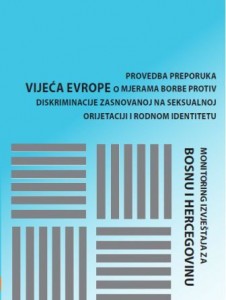
Keywords: council of the EU; LGBT population; recommendations; sexual discrimination; gender identity discrimination; BiH; report;
Jedina mjera koju su bosanskohercegovačke vlasti preuzele u skladu s Preporukom Vijeća Evrope upućene državama članicama o mjerama za borbu protiv diskriminacije zasnovane na seksualnoj orijentaciji ili rodnom identitetu (Preporukom CM/ REC(2010)5) jeste uključivanje seksualne orijentacije i seksualnog izražavanja u antidiskriminaciono zakonodavstvo. Međutim, u nedostatku drugih mjera, te u svjetlu teške društvene netrpeljivosti, ovo zakonodavstvo pruža slabu zaštitu lezbejkama, gej i biseksualnim osobama. Prema saznanjima Sarajevskog otvorenog centra, vlasti nisu usvojile nikakve druge mjere za provođenje zahtjeva navedene Preporuke. Konkretno, nije bilo revizije postojeće legislative i drugih mjera koje bi mogle, direktno ili indirektno, dovesti do diskriminacije, ne postoji odredba za zaštitu od diskriminacije na osnovu rodnog identiteta i nema uvođenja sveobuhvatne strategije usmjerene na rješavanje problema javne diskriminacije i na suzbijanje predrasuda i stereotipa. Preporuka i njen Dodatak nisu prevedeni niti su distribuirani široj javnosti od strane vlasti ili civilnog društva. Predrasuda zasnovana na seksualnoj orijentaciji (ali ne i na rodnom identitetu) kao motiv krivičnog djela uzima se kao otežavajuća okolnost u krivičnim zakonima Republike Srpske i Brčko distrikta, ali ne i u Federaciji BiH. Čini se da nema posebne obuke za policijske službenike i pravosuđe u vezi sa homofobnim i transfobnim zločinima iz mržnje, niti za zatvorske službenike u vezi sa LGBT zatvorenicima_cama. Ako i ima podataka o ovome, nisu transparentni i ostali su nam nepoznati. Bosna i Hercegovina nema zakona koji zabranjuju govor mržnje ili podstrekavanje na mržnju na osnovu seksualne orijentacije ili rodnog identiteta (uključujući i govor mržnje na internetu). Iako sloboda izražavanja i okupljanja LGBT osoba postoji u teoriji, nasilje za vrijeme Queer Sarajevo Festivala, kao i neuspjeh vlasti da pruži zaštitu učesnicima_ama, pokazuju da je stvarnost drugačija. Da li i koliko su se stvari poboljšale, bit će vidljivo onda kada LGBT zajednica stekne povjerenje da ponovo pokuša ostvariti slobodu izražavanja i udruživanja u javnom prostoru. Istospolne seksualne radnje nisu krivična djela. Nisu preduzeti koraci za uklanjanje diskriminacije u pristupu pravima parova i roditeljstva. Onda kada je promjena spola završena, pojedinac_ka može podnijeti zahtjev za izmjenu oznake spola u svim zvaničnim dokumentima uključujući, u prvoj fazi, jedinstveni matični broj. Stoga, u proceduri zakonske izmjene spola izražen je uvredljiv zahtjev, kojim se traži da osoba u potpunosti hirurški izmijeni spol kako bi se oznaka spola u njegovim_njenim zvaničnim dokumentima promijenila, čime se povređuje pravo na vlastito rodno izražavanje. Zakon o radu Brčko distrikta i Zakon o radu u institucijama BiH zabranjuju diskriminaciju na osnovu seksualne orijentacije, ali isti zakoni u Federaciji BiH i Republici Srpskoj ne zabranjuju. Prema informacijama koje je Sarajevski otvoreni centar dobio od institucija vlasti, nijedna druga mjera koju predlaže Preporuka nije poduzeta, uključujući i one u vezi sa oružanim snagama, kao i privatnošću transrodnih osoba. Zakon o zabrani diskriminacije Bosne i Hercegovine, kao i neki pravni instrumenti na entitetskom nivou, izričito zabranjuju diskriminaciju na osnovu seksualne orijentacije u obrazovanju, ali isto tako ne uključuju izričito diskriminaciju i na osnovu rodnog identiteta. Međutim, druge mjere, kao što je očuvanje prava djece i mladih na obrazovanje u bezbjednom okruženju izuzetom od nasilja, socijalne isključenosti i drugih oblika diskriminacije, koje su predložene Preporukom, nisu provedene. Analiza školskih udžbenika pokazuje da se u nekima homoseksualnost definiše kao bolest i svrstava u grupu poremećaja poput pedofilije i narkomanije. Homoseksualnost se više ne klasifikuje kao bolest, programi prevencije HIV-a/ AIDS-a uključuju LGBT osobe, a LGBT osobe mogu da identifikuju svoje partnere kao kontakt osobu u slučajevima nužde. Ipak, čini se da druge mjere koje se odnos na oblast zdravstva, koje su predložene Preporukom, nisu primjenjene. Zakon o zabrani diskriminacije BiH zabranjuje diskriminaciju na osnovu seksualne orijentacije u oblasti stanovanja, ali ne i na osnovu rodnog identiteta. Ni u ovoj oblasti nisu provedene konkretne mjere predložene Preporukom. Bosanskohercegovački zakoni ne navode izričito seksualnu orijentaciju ili rodni identitet u kontekstu azila. Ovlaštenja ombudsmena za ljudska prava izričito uključuju seksualnu orijentaciju, ali ne i rodni identitet. Međutim, ombudsmen je uključio rodni identitet u radu Institucije i, u granicama svojih resursa, sprovodi neke od aktivnosti predloženih Preporukom. Ipak, zbog nedostatka sredstava, Institucija ombudsmena/ombudsmana za ljudska prava BiH ne sprovodi opsežne javne kampanje u cilju promicanja antidiskriminacije na osnovu seksualne orijentacije i rodnog identiteta.
More...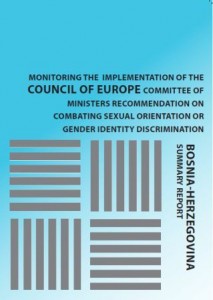
Keywords: implementation monitoring; Council of Europe Committee of Ministers; SOGI Discrimination; BiH;
The only measure taken by Bosnian-Herzegovinian authorities in compliance with the Recommendation CM/Rec(2010)5 is the inclusion of sexual orientation and sexual expression in anti-discrimination legislation. However, in the absence of other measures, and in the face of severe social hostility, it offers little protection to lesbian, gay, and bisexual persons. So far as the Sarajevo Open Centre has been able to ascertain, the authorities have adopted no other measures to implement the requirements of the aforementioned Recommendation. In particular, there has been no review of existing legislative and other measures that could result directly or indirectly in discrimination, no provision for protection from discrimination on grounds of gender identity, and no introduction of a comprehensive strategy aimed at tackling discriminatory attitudes within the general public and correcting prejudices and stereotypes. The Recommendation and its Appendix have not been translated, and have not been disseminated either within government or civil society. A bias motive based on sexual orientation (but not gender identity) is included as an aggravating circumstance in the criminal codes of the Republic of Srpska and Brcko District, but not in that of the Federation of BiH. There appears to be no specific training for police officers and judiciary in relation to homophobic or transphobic hate crimes, nor for prison officers in relation to LGBT prisoners. There is no collection of data in this field. There are no laws prohibiting “hate speech” or incitement to hatred on grounds of sexual orientation or gender identity (including on the Internet) Although freedom of expression and assembly exist in theory for LGBT people, the violence at the time of the Queer Sarajevo Festival, and the failure of authorities to provide protection, demonstrate that the reality at that time was very different. How far things have improved will only be tested when the LGBT community gains the confidence to try to exercise freedom of expression and assembly fully again. Same-sex sexual acts are not criminalised. No steps have been taken to remove discrimination in access to rights of couples and parenting. Once gender reassignment is completed, the individual can apply for changes to the gender marker in all official documents including, as a first stage, the identification number. Therefore at least one abusive requirement, that of gender reassignment surgery, exists. The Labour Law of the Brcko District and Labour Law of the institutions of BiH prohibits sexual orientation discrimination, but equivalent legislation in the Republic of Srpska and the Federation of BiH does not. It appears that none of the other measures proposed by the Recommendation have been taken, including in relation to the armed forces, and the privacy of transgender persons. The BiH Anti-Discrimination Law, and some legal instruments at entity level, specifically prohibit sexual orientation discrimination in education, but it does not specifically include gender identity discrimination. It appears that no other measures proposed by the Recommendation have been acted on. A study of school textbooks found that some still define homosexuality as an illness and include it group of disorders such as paedophilia and drug addiction. Homosexuality is no longer classified as a disease, HIV/AIDS prevention programme includes LGBT people, and there is nothing in principle that would prevent LGBT persons identifying their partner as “next of kin”. However, it seems that other measures proposed by the Recommendation have not been carried out. The BiH Anti-Discrimination Law prohibits discrimination in the field of housing on grounds of sexual orientation, but it does not specifically include gender identity. Apart from this, there is little suggests that any steps have been taken to address the other measures proposed by the Recommendation None of the specific measures proposed by the Recommendation have been implemented in the field of measures to prevent discrimination in the field of sports. BiH law does not explicitly recognise sexual orientation or gender identity in the context of asylum. No action has been taken in relation to the measures proposed by the Recommendation. The mandate of the Ombudsman for Human Rights explicitly includes sexual orientation but not gender identity. However, the Ombudsman has included gender identity in the work of the/ Office, and has, within the limits of his resources, conducted some activities along the lines proposed by the Recommendation. However, due to lack of resources, the Ombudsman’s office does not carry out extensive public campaigns in order to promote anti-discrimination on grounds of sexual orientation and gender identity.
More...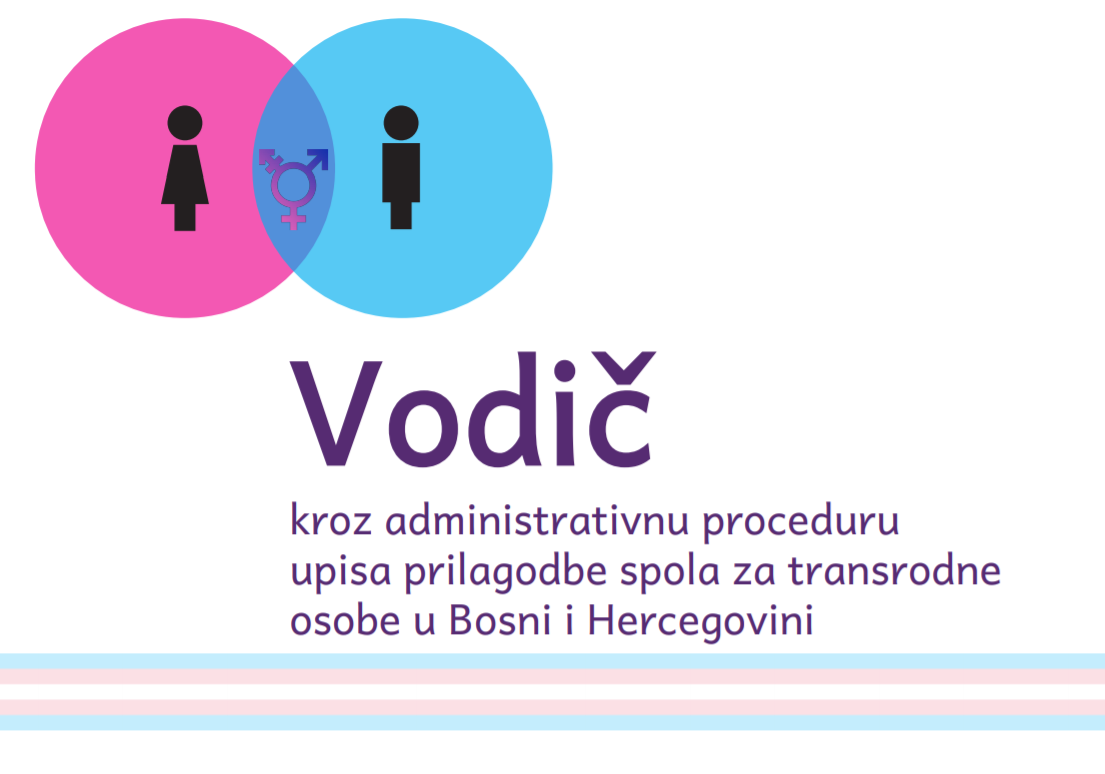
Keywords: sex adjustment; transgender; administrative procedure; BiH;
Sam termin procedura najčešće asocira na niz nepremostivih prepreka do dostizanja cilja, ili na poduzimanje određenih radnji koje nam uvijek oduzmu više vremena nego što je potrebno. Ova asocijacija donekle je i opravdana kada su u pitanju administrativne procedure (postupci) i procesi u Bosni i Hercegovini zbog složenosti njenog političkog sistema i velikog broja birokratskih institucija. Međutim, ono što procedura jeste i treba da bude predstavlja usaglašen i jasan proces kojim se kroz niz propisanih i jasno određenih radnji izvršava određeni posao i dolazi do određenog rješenja. Svaka administrativna procedura ili administrativni postupak treba biti transparentan, efikasan i jednostavan; bitno je da bude precizno i jasno propisan aktima koji su dostupni javnosti, te da postoje mehanizmi njegove kontrole.
More...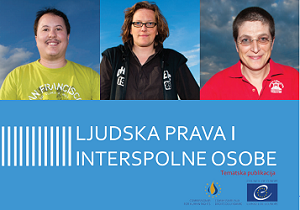
Keywords: human rights; intersex people; medicalization; law; LGBTI; discrimination; violence;
Binarne klasifikacije spola i roda sveprisutne su u našem društvu i utiču na to kako razumijevamo i organiziramo svijet oko nas. Klasifikacija čovječanstva u dvije kategorije – Ž (žensko) i M (muško) – kao i njihova utemeljenost u identifikacijskim dokumentima izlaže kršenju ljudskih prava osobe koje se ne uklapaju u potpunosti u te dvije kategorije. Među njima su interspolne osobe posebno ranjive. Stereotipi koji se vezuju za navodnu dihotomiju roda, kao i za medicinske norme takozvanih ženskih i muških tijela, omogućili su prakticiranje rutinskih medicinskih i hirurških intervencija na interspolnim osobama, čak i kada su takve intervencije kozmetičke, a ne medicinski potrebne ili u slučajevima kada o njima dotične osobe nisu konsultirane niti informirane.Tajnovitost i stid koji se vezuju za interspolna tijela omogućili su da se te prakse odvijaju decenijama, dok se istovremeno problematika ljudskih prava uglavnom nije ni razmatrala. Evropsko društvo do dana današnjeg ostaje u velikoj mjeri nesvjesno stvarnosti koju žive interspolne osobe. Ipak, kroz pionirski rad sve većeg broja interspolnih grupa i pojedinačnih aktivistkinja i aktivista, ljudskopravaške zajednice i međunarodne organizacije postaju sve više svjesne ove situacije i nastoje se suočiti s tom problematikom pozivajući se na standarde ljudskih prava. U maju 2014. godine, Komesar za ljudska prava objavio je Komentar na ljudska prava pod nazivom “Dječak ili djevojčica ili osoba – interspolne osobe nepriznate u Evropi”, u kojem su naglašeni problemi u vezi sa ljudskim pravima s kojima se suočavaju interspolne osobe. Ova tematska publikacija daje detaljnije upute i sadrži preporuke Komesara u cilju rješavanja ove problematike. Publikacija ima svrhu da informira vlasti i praktičare o trenutnim etičkim razmatranjima i ljudskim pravima u ovom smislu, kao i o najboljim globalnim praksama. Prije izrade ovog dokumenta, obavljene su konsultacije sa aktivistkinjama i aktivistima za interspolna prava i medicinskim stručnjacima i stručnjakinjama. Poduzeto je već nekoliko pozitivnih koraka ka razumijevanju situacije u kojoj se nalaze interspolne osobe i u reagiranju na njihove probleme. Nedavno usvajanje međuresorne izjave Ujedinjenih nacija (UN) o sterilizaciji koja tretira i kršenje tjelesnog integriteta interspolnih osoba predstavlja prekretnicu u kombiniranju medicinskog i ljudskopravaškog pristupa. Objavljivanjem izvještaja o interspolnim osobama koji su pripremila nacionalna vijeća za medicinsku etiku povećana je svijest o problemima sa kojima se te osobe suočavaju. Poduzete su i korisne inicijative za zaštitu interspolnih osoba od diskriminacije kroz reforme zakonodavstva koje se odnosi na jednako postupanje. Postoji urgentna potreba za daljnjim napretkom da bi se poboljšala situacija po pitanju ostvarivanja ljudskih prava interspolnih osoba. Ova tematska publikacija ima cilj da potakne razvoj okvira djelovanja sugerirajući dvotračni pristup. S jedne strane, poziva zemlje članice da ukinu medicinski nepotreban tretman “normalizacije” interspolnih osoba kada se on provodi ili propisuje bez slobodnog i potpuno informiranog pristanka dotične osobe. S druge strane, publikacija predstavlja moguće naredne korake u smislu zaštite interspolnih osoba od diskriminacije, adekvatnog priznavanja njihovog spola u zvaničnim dokumentima i pristupa pravdi.
More...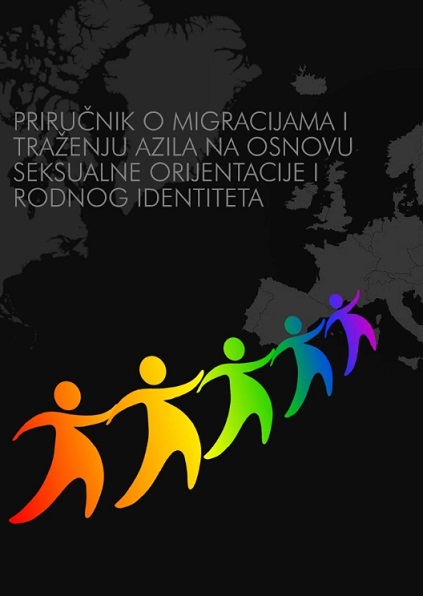
Keywords: Bosnia and Herzegovina; youth; migration; asylum seeking; sexual orientation; gender identity; politics; discrimination; human rights; LGBTI persons; leaving homeland;
Pitanje odlaska mladih iz Bosne i Hercegovine je jedna od najaktuelnijih tema u bh. društvu. Slaba ekonomska situacija, spor i neadekvatan sistem i njegove institucije koje često zakažu kada su najpotrebnije svojim građanima te nestabilna politička situacija su faktori koji se najčešće ističu kod mladih kao razlog odlaska ili želje za odlaskom iz države. Položaj LGBTI osoba u tom istom društvu je itekako pod uticajem gore navedenih faktora. Pored istih potrebno je navesti niz dodatnih problema, sa kojima se suočavaju LGBTI osobe koji, u konačnici, utiču da veliki broj LGBTI osoba u BiH ne žele ili ne mogu zamisliti svoju budućnost u BiH. Od nepovjerenja u institucije (najprije policije i pravosuđe), nasilja i diskriminacije u raznim sferama društva, nepostojanje zdravstvene zaštite i podrške za trans* i interspolne osobe do straha od coming out-a i nedostatka podrške od najbliže okoline. Upravo iz navedenih razloga LGBTI osobe često kao rješenje svojih problema vide napuštanje države i odlazak u zemlje Zapadne Evrope ili Sjeverne Amerike. Neki to čine kroz pronalazak posla u drugoj državi ili nastavak školovanja, drugi kroz osnivanje porodice sa stranim državljanima, a neki i kroz traženje zaštite druge države, odnosno, upuštanja u proceduru traženja azila. Ovaj proces je komplikovan, dugotrajan, često psihološki iscrpan te čiji pozitivni ishod nije zagarantovan i zavisi od slučaja do slučaja. U ovom kratkom vodiču namijenjenom prije svega LGBTI osobama ali i svima drugima koje tema interesuje biće ukratko prikazano šta je azil, pravni aspekti, kako izgleda procedura, koje su specifičnosti kada je u pitanju traženje azila na osnovu seksualne orijentacije ili rodnog identiteta, te odgovor na najbitnija pitanja koja jedna osoba može imati ukoliko se nađe u situaciji da traži azil. Kompletnu temu nije moguće do detalja obraditi u ovako kratkom formatu, stoga vodič treba posmatrati kao uvod u temu i smjernice za daljnje djelovanje ili istraživanje ove teme.
More...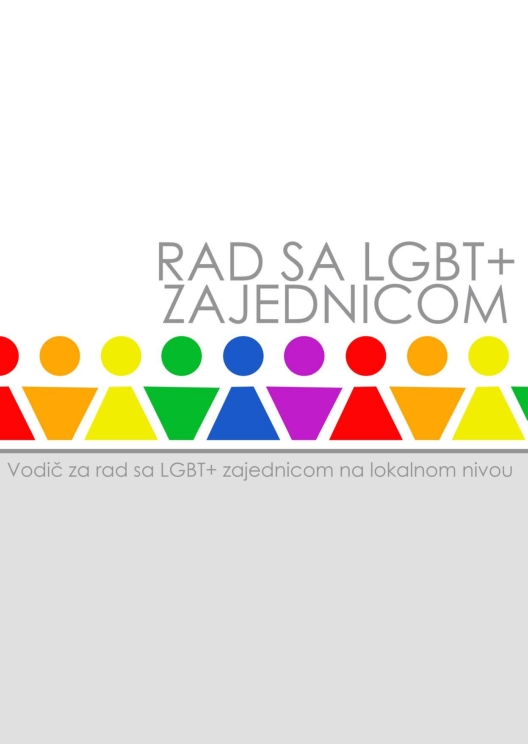
Keywords: LGBT+ community; LGBT+ persons; quality of life; social changes; civil society; NGO; local level;
Unapređenje poštovanja prava LGBT+ osoba i kvaliteta njihovog života tema je kojom se bave različite profesije, od pravnica, socijalnih radnika, psihologinja do aktivista i samih LGBT+ osoba. Izazovi sa kojima se LGBT+ osobe suočavaju u svom životu upravo su takvi da je potrebno da se ovako širok dijapazon profesija uključi i doprinese postizanju pozitivnih društvenih promjena. Rad sa LGBT+ zajednicom je vodič koji govori o problemima i izazovima sa kojima se LGBT+ osobe suočavaju u svakodnevnom životu i o tome kako aktivisti i aktivistkinje mogu zajedno sa LGBT+ osobama da kreiraju rješenja za unapređenje kvaliteta života. Vodič je organizovan tako da na praktičan i interaktivan način provede čitaoce_teljke kroz teme poput aktivizma, zajednice, aktivnosti i metodologije u radu sa zajednicom i saveznika u aktivizmu, te da ih podrži u samom osmišljavanju aktivnosti na lokalnom nivou. Vodič Rad sa LGBT+ zajednicom namijenjen je prije svega formalnim i neformalnim grupama, pojedincima i pojedinkama koje žele da se bave temom unapređenja kvaliteta života LGBT+ populacije kroz direktan rad sa LGBT+ osobama, kao i ostalim aktivistima_kinjama u civilnom sektoru zainteresovanim za ovu oblast. [...]
More...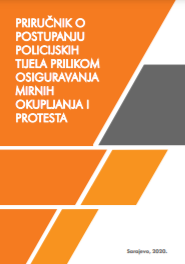
Keywords: BiH; freedom of assembly; peaceful assembly; security; police forces; guidebook; legislation; law; human rights;
Sloboda mirnog okupljanja je pravo koje je prepoznato i zaštićeno u više međunarodnih instrumenata za zaštitu ljudskih prava. Budući da je njihova potpisnica, Bosna i Hercegovina (BiH) se obvezala na zaštitu ostvarivanja ovog prava sukladno standardima koje podrazumijevaju značajni instrumenti. U unutarnjem kontekstu BiH, sloboda mirnog okupljanja je zaštićena Ustavom BiH, ustavima entiteta, Statutom Brčko distrikta BiH te zakonima o javnom okupljanju na razini Republike Srpske, županija u Federaciji BiH te Brčko distrikta BiH. Na teritoriju BiH trenutno je na snazi čak dvanaest zakona o javnom okupljanju, što ide u prilog već ustaljenoj procjeni iz brojnih pravnih analiza o različitom, a često i kontradiktornom načinu reguliranja, a samim tim i ostvarivanja prava na slobodu mirnog okupljanja u BiH.
More...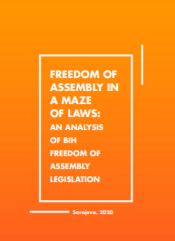
Keywords: BiH; legislation; freedom of assembly; organizer obligations; location and time of the assembly; assembly ban; OSCE; human rights;
This analysis is organised in chapters that address the most important thematic areas for the exercise of the right to freedom of peaceful assembly. First, the paper presents the research implementation method and a summary of documents containing key international recommendations for regulating the freedom of peaceful assembly. As a starting point for the analysis, the definitions of public assembly protected by BiH legislation are discussed, and a special focus is placed on peaceful assembly and public protest as the most important forms of public assembly for the purposes of this research. Significant space is devoted to the notification requirement, an area with probably most contradictions among the provisions of all the laws on public assembly in force in BiH. This aspect of the exercise of the right to freedom of peaceful assembly has been analysed primarily in light of a comparison of the notification system and the authorisation system, which is explicitly criticised by all relevant international recommendations. This is followed by restrictions, as well as privileges that the legislative framework subjects assembly organisers to, depending on their affiliation with certain categories or groups (e.g. restrictions for foreign nationals as opposed to privileges for trade unions). This chapter also reflects on a special type of assembly - unorganised, spontaneous assemblies as an immediate response to an event or an occurrence in the society, making assembly notification unfeasible. National legislation requirements have also been analysed with respect to data requested for assembly notification and the (non-)harmonisation of the deadlines and international standards. The issue of assembly location is also extensively discussed, as there are significant discrepancies between local laws, but also local laws and international standards due to bans on assemblies in many otherwise publicly available locations. The actions of authorities aimed at making it difficult for the organisers to choose a location they consider most appropriate for their peaceful assembly or public protest are visible. Assembly time is discussed in light of restrictive provisions in certain laws that limit the possibilities by imposing specific timing. Legal remedy in case of imposed restrictions on public assemblies is addressed from the perspective of the necessary urgency of the legal protection procedure, i.e., the need to complete the entire procedure in a timely fashion, from the decision on the ban to deciding on the appeal, so that the organisers can continue with assembly planning. The differences in the responsibilities expected of police bodies in providing security at peaceful assemblies and the duties and responsibilities imposed on organisers, leaders and stewards of public assemblies are compared. This chapter addresses a particular concern given that the guiding principle of freedom of peaceful assembly is that the competent authorities have a primary obligation to facilitate the enjoyment of the right to freedom of peaceful assembly. The last part of this paper addresses the provisions governing the reasons why police authorities may ban or interrupt an ongoing assembly and the sanctions provided by law. Finally, specific recommendations are given from the perspective of international standards that could significantly improve freedom of assembly in BiH through appropriate advocacy activities.
More...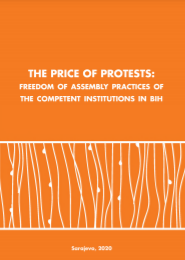
Keywords: BiH; freedom of assembly; institution practices; legislation; organization of assembly; notification; banning public assemblies; authorities; human rights;
This Report analyses the right to freedom of assembly, with a focus on practices of the competent authorities: the ministries of the interior in the cantons of the Federation of Bosnia and Herzegovina and the Republika Srpska, and the Police of Brčko District. The practice of other actors in Bosnia and Herzegovina has also been researched, those competent to decide on the exercise of the right to assembly (ministries of transport, municipal bodies, private persons). Although the focus is on practice, positive regulations pertaining to notifications and the possibility of banning assemblies have also been analysed, as well as their compliance with international standards. The main goal of the research was to determine whether the practice of the institutions in Bosnia and Herzegovina is restrictive with respect to the right to freedom of assembly and what are the challenges that assembly organisers face. The research covered the entire territory of Bosnia and Herzegovina in the time period from 1 January 2017 until 31 December 2019. The results of the research indicate that the number of public assemblies in Bosnia and Herzegovina is growing, as is the number of their participants. Legislation, however, differs in different parts of Bosnia and Herzegovina, with the common characteristic that it is not in line with international standards. Poor legislation, its poor application in practice and the large discretion granted to actors in this field lead to restrictions and discrimination in the exercise of the right to public assembly in Bosnia and Herzegovina. Practices of the authorities vary depending on assembly purpose, i.e., they are restrictive where assemblies tend to criticize the local government or focus on the rights of women and LGBTI people. Therefore, it is necessary to align domestic laws throughout the country, to harmonize them with international standards and to continuously train state authorities with respect to international standards in this field and their application. In view of the above, this Report makes recommendations for the development of a quality framework for the exercise of the right to freedom of assembly in Bosnia and Herzegovina, in line with international standards.
More...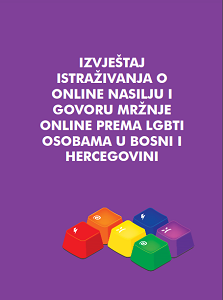
Keywords: LGBTIQ+; human rights; hate speech; violence; BiH; report;
U današnjem digitalnom dobu, sloboda izražavanja na internetu predstavlja ključni element demokratskog društva, omogućavajući široku participaciju i razmjenu ideja. Međutim, ova sloboda često se zloupotrebljava za širenje govora mržnje i online nasilja, posebno prema ranjivim društvenim grupama kao što su LGBTIQ+ osobe. Bosna i Hercegovina suočava se sa izazovima nedovoljne zaštite LGBTIQ+ zajednice od online nasilja i govora mržnje, što se dodatno komplicira fragmentiranim, neprilagođenim i nejasnim zakonodavnim okvirom, uključujući neadekvatnu provedbu navedenog, kao i nedostatkom efikasnih institucionalnih odgovora.
More...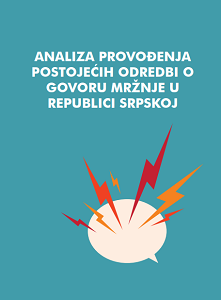
Keywords: BiH; Republika Srpska; hate speech; provisions; implementation; analysis;
Govor mržnje, kao manifestacija netolerancije i preteča nasilja, predstavlja značajan izazov kako društvenoj koheziji tako i načelima demokratskog upravljanja i demokratskog, tolerantnog i savremenog društva uopšte. Regulacija govora mržnje postavlja složena pravna (i etička) pitanja, balansirajući između zaštite javnog reda i dostojanstva pojedinca i temeljnog prava na slobodu izražavanja. U Republici Srpskoj zakonski okvir koji (u određenoj mjeri) regulira „govor mržnje“ uveden je sa novim Krivičnim zakonikom Republike Srpske 2017. godine (u daljem tekstu: KZ RS).1 Navedeni okvir prvenstveno je sadržan u članu 359. KZ RS koji predviđa krivično djelo Javno izazivanje i podsticanje nasilja i mržnje. Ova odredba ima za cilj suzbijanje izražavanja koja podstiču nasilje i mržnju na temelju nacionalne, rasne, vjerske ili etničke pripadnosti, boje kože, spola, seksualnog opredjeljenja, invaliditeta, rodnog identiteta, porijekla ili kakvih drugih (zaštićenih) osobina. Predmet ove analize jeste upravo teorijski i praktični pogled na član 359. KZ RS, odnosno ispitivanje njegovog opsega, primjene i učinkovitosti (djelotvornosti) unutar pravnog okvira Republike Srpske.
More...